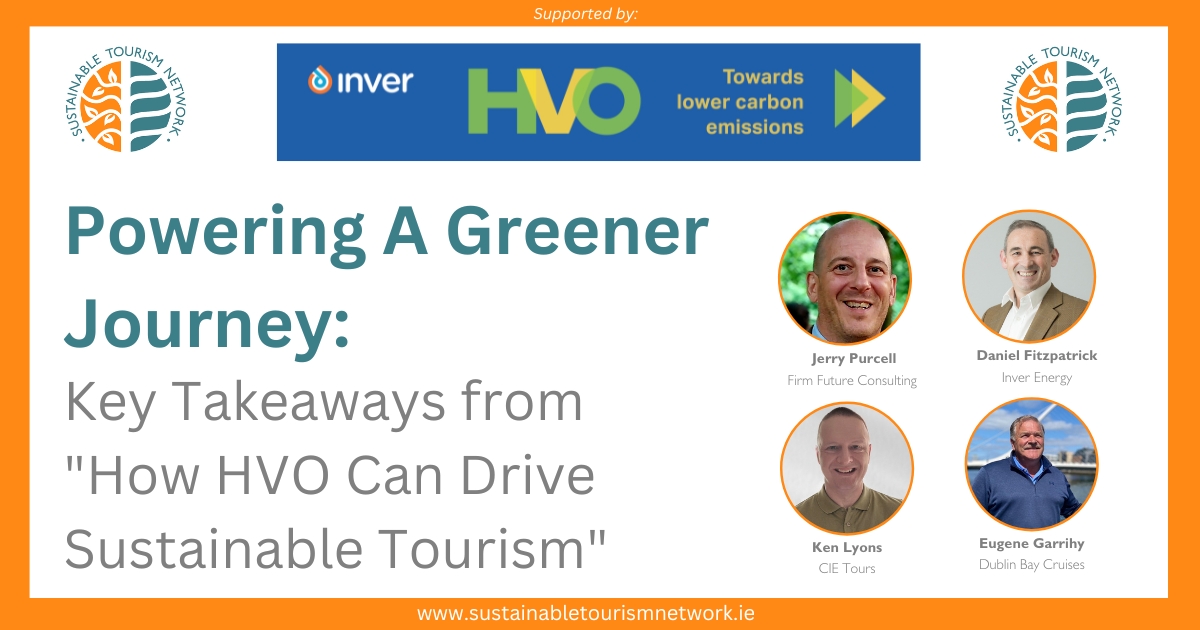Powering A Greener Journey: Key Takeaways From “How HVO Can Drive Sustainable Tourism”

Here at the Sustainable Tourism Network, we recently hosted a timely and thought-provoking webinar: “How HVO Can Drive Sustainable Tourism”, and it delivered powerful insights into one of the tourism sector’s most promising decarbonization tools – HVO (Hydrotreated Vegetable Oil).
Supported by Inver Energy Ireland and moderated by Jerry Purcell of Firm Future Consulting, the panel brought together energy experts and tourism operators already embracing HVO, including Eugene Garrihy (Dublin Bay Cruises), Ken Lyons (CIE Tours), and Daniel Fitzpatrick (Inver Energy Ireland).
Here are the key takeaways that every tourism and travel professional should know:
🌿 1. HVO: A Drop-In, Low-Carbon Fuel
HVO is a renewable diesel made from waste oils and fats – including used cooking oil and animal fats – and refined through hydrotreatment. Unlike traditional biodiesel, HVO is stable, engine-compatible, and 100% substitutable for conventional diesel. This means no retrofitting is needed – you can use it straight away in existing diesel engines or heating systems.
It offers up to 90% reduction in CO₂ emissions and vastly improves local air quality by lowering sulfur oxides, particulates, and carbon monoxide from tailpipe emissions.
🔧 2. It Works — No Engineering Required
As highlighted by Ken Lyons of CIE Tours, one of the most persistent concerns is whether HVO negatively impacts engines. After a trial tour covering over 28,000 kilometers using HVO, Ken confirmed no loss in engine performance, no clogging, and equal mileage per liter compared to diesel.
For Eugene Garrihy, who runs Dublin Bay Cruises, switching to HVO was part of a broader circular economy and sustainability vision. His business saw major emission cuts without buying new boats – just by rebuilding and maintaining existing engines, slowing speeds, and burning HVO.
💸 3. Cost Vs Carbon: Yes, There’s A Price Tag
Currently, HVO is marginally more expensive than diesel – between 16 to 21 cent per litre more, depending on factors like supply, location, and whether the buyer requires a sustainability certificate.
Yet, as panelists stressed, the lack of government support is a key hurdle. Diesel receives tax rebates not extended to HVO, which creates an uneven playing field despite HVO’s clear climate benefits.
Calls were made during the session for policy reform: to reduce excise duty on HVO and create parity with fossil fuels to accelerate adoption.
🚛 4. HVO Is Ready Now — But Supply & Demand Will Shape The Future
Daniel Fitzpatrick from Inver Energy Ireland explained that while HVO supply is growing, its future is intertwined with competing demand sectors like aviation and marine transport. With the aviation industry facing a 2% Sustainable Aviation Fuel (SAF) mandate, some of the HVO feedstocks could be redirected, impacting availability and price.
Still, the good news is that HVO can be produced from a wide variety of wastes, giving it flexibility and resilience in the face of growing demand.
📦 5. Availability In Ireland Is Expanding
Although not yet available everywhere, Inver and other distributors are expanding their delivery network and storage solutions, including custom tanking options for remote businesses. If there’s demand, Daniel says, they’ll find a way to supply.
And yes – HVO performs well in cold weather, according to both Inver and user experience.
🤝 6. Action, Not Just Talk: A Model For Meaningful Change
Perhaps the most resonant message came from the operators themselves. Both Eugene and Ken emphasised that adopting HVO wasn’t a PR stunt – it was about doing something tangible for the climate, while continuing to serve guests.
Ken shared that 32% of CIE Tours’ 2025 passengers will ride on coaches running HVO – a direct result of a successful pilot and shared investment with their transport partners.
🧭 Final Thoughts: HVO As A Bridge, Not A Destination
As Jerry aptly put it, HVO isn’t a silver bullet or a forever solution – but it’s a powerful bridging tool. It offers immediate, significant carbon cuts for tourism businesses in transport and heating, especially when zero-emission alternatives are still out of reach.
The technology is ready. The infrastructure is growing. What’s needed now? Policy support, wider awareness, and collective action.
💬 Want to be part of the shift? Talk to a fuel supplier about HVO, such as Inver Energy Ireland, explore government incentives, and start including emission reduction in your guest experience.
🚀 Because sustainable tourism doesn’t have to wait for tomorrow – it can start with the next tank of fuel and get ready to be ‘suckin’ HVO fuel’ when it comes to your carbon reduction targets.
This webinar was facilitated by the Sustainable Tourism Network (STN) and complimentary to members of STN. If you would like to know more about the array of benefits attached to being a member of STN such as the plentiful educational supports, free webinars and online training, visit here or hop on a call with Aoibheann today here.


